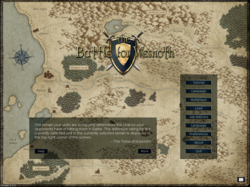 For me The Battle for Wesnoth shaped up as one of those really intriguing, superficially engaging but ultimately somewhat disappointing gaming experiences. I theory I really like the idea and the premise (the classic role playing scenario of starting off lowly and building up one's army and power to greater and greater heights - a handy metaphor for life I suppose!). I also really like the idea that the game is open source and cross platform which means that it can be played on pretty much any platform including free ones; potentially lowering the entry / equity bar for students in a range of schools.
For me The Battle for Wesnoth shaped up as one of those really intriguing, superficially engaging but ultimately somewhat disappointing gaming experiences. I theory I really like the idea and the premise (the classic role playing scenario of starting off lowly and building up one's army and power to greater and greater heights - a handy metaphor for life I suppose!). I also really like the idea that the game is open source and cross platform which means that it can be played on pretty much any platform including free ones; potentially lowering the entry / equity bar for students in a range of schools. Ultimately, however, I found the very 'realness' of the game's task off putting from an educationalist perspective - in as much as the game requires a considerable amount of time to get fluent with it (well for me anyway) and this requires a commitment and engagement to the idea of learning to master the game that I find hard to muster in practice.
However from a teacher's point of view this game could be empowering for students because its fantasy elements are reasonably intriguing for most kids and the idea of conquering others certainly appeals - these could all be used to model / front or back end real world learning areas and help develop strategic thinking capabilities. Frankly I'd see equal benefit in teaching kids chess / checkers and those game have lower entry points with high potential exit points and those games also support a higher degree of (when engaged) face-to-face dialogue and interaction. Perhaps I just like quick and simple games that teach a point.
At any rate virtual worlds certainly provide educational opportunities and great potential:For a teacher that sings to that tune I suppose - which would be consistent with the idea that learning is facilitated when experiences are embedded into a context into which the skills being used can transcend the context of the classroom and where students, in effect can use the sort of environment / worlds] of Wesnoth to practice their strategic learning in a 'real' (albeit virtual) context with all of the complexity that such a 'real' world implies. My ideas about quick games of chess could - in this context - seem more unreal to kids than the virtual world. And I'm not even a very good chess player.

One of the four most important aspects of cognitive psychology as it relates to instructional game design is affect (Thurman, 1993). The rich media and multiple representations of games and computer based instruction (CBI) in general can boost affect and motivation (Van Eck, 2000, citing Hannafin & Peck, 1988). Furthermore, in a well-designed game, players learn because they need to in order to play the game - motivation is built into the game itself. Lepper and Malone (1987) identify seven theories of "intrinsic motivation" to guide the processes involved in game design:
ReplyDeleteChallenge;
Curiosity;
Control;
Fantasy;
Competition;
Cooperation;
Recognition.
The last three elements of intrinsic motivation were categorised as "interpersonal motivation". These three theories are of particular interest in the application of MMORPGs to collaborative learning and teaching practice in schools. Collaborative learning (CL), has its roots in the work of Piaget (1951) and Vygotsky (1978) and is based on the view that learners learn best through positive, cooperative interactions with one another. Computer supported collaborative learning (CSCL) focuses on the use of information and communication technologies (ICTs) as a mediating tool for collaborative virtual environments (CVEs), and as such can serve as a theoretical paradigm for online role playing games to support learning. Founded in social constructivism, CL and CSCL emphasise an under-standing of language, culture and the social setting. They are especially worthwhile where problem solving or project based learning is concerned (Johnson & Johnson, 1999; Johnson, Johnson & Stanne, 2004) with achieving a common group goal. A MMORPG by its nature, is both problem based and project based in learning.
Quoted from: Lee, M. J. W., Eustace, K., Fellows, G., Bytheway, A. and Irving, L. (2005). Rochester Castle MMORPG: Instructional gaming and collaborative learning at a Western Australian school. Australasian Journal of Educational Technology, 21(4), 446-469. http://www.ascilite.org.au/ajet/ajet21/lee.html